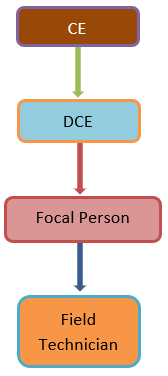Introduction to the project: Bangladesh is an agricultural country. Farm mechanization is important in crop production. It is difficult to feed 150 million people from 8.2 million hectares of arable land. With a total population of 0.20 million being added every year, there is a reduction of 0.07 million hectares of agricultural land per year for housing, offices, roads, mills, etc. Agricultural mechanization has become essential in view of the growing population and food demand of Bangladesh. According to a 2015 publication by AIS, 8-10 per cent of the total grain crop is lost every year due to mismanagement of post-harvest machinery alone.
At present, 56,418 tractors, 6,753 power tillers, 175,103 waders, and 23 combine harvesters are being used in the country. In addition, 20,000 tractors and power tillers are being added to the country every year. As a result of mechanization in all fields of agriculture, it is possible to produce more than 60 million tons of grain every year.
In Bangladesh, the amount of cultivable land is getting haram at the rate of 1 percent every year. On the other hand, the population is growing at a rate of 1.38 percent. To meet the food needs of this growing population, reduce the poverty rate to zero by 2030 according to sustainable development, and starvation according to sustainable development. The government is focusing on ensuring safe and nutritious food and applying and expanding modern technology for sustainable agricultural production.
In its aftermath, post-production crop losses due to labor shortages during the harvest season have become widespread. On the other hand, there is a shortage of about 45% agricultural labor in Bangladesh for planting, cutting, threshing and warehousing of paddy. With the mechanization of proper mechanization, this deficiency can be overcome.
There is no alternative to agricultural mechanization to reduce the cost of crop production, harvesting, threshing and warehousing. This initiative helps the farmers to increase their income significantly.
Project Participants/Beneficiaries : In the last one year about 45 entrepreneurs have been created in four upazilas of Dinajpur district namely, Chirirbandar, Parbatipur, Fhulbari and Birampur under the agricultural mechanization program.
The socio-economic status of the entrepreneurs included in the project is improved. As a result of entrepreneurship in the region, the unemployment rate is reduced. Production of agricultural work increased by 75% from earlier. As a As a result, their quality of life and livelihood is improved. This is saving farmers' time and labor.
During the project, a total of 150 people were imparted training in 6 batches of entrepreneurs and officials associated with the project. As a result, Entrepreneurs are able to repair any problem in the first place.
Besides, work is being done to increase the number of new entrepreneurs by organizing field days for various new machines. In this way people are being attracted toward new agricultural machines.
Project period: Duration of two years, from July 1, 2019 to June 1, 2022.
Project Objective:
· Creating business entrepreneurs in agricultural machinery.
· Increase the efficiency of local agricultural machinery workshops.
· Cost reduction at all levels in agriculture.
· Provide assistance to entrepreneurs in obtaining government subsidy for agricultural mechanization.
· Provide support for loan programs.
· Arranging low interest loans.
· Creation of new sectors for credit programs.
Donor /project funded by : PKSF's own funding project.
Implementation Location/Geographical area:
Organogram of the project:

Major area of Intervention/Component:
Major Activities:
The main program of agricultural mechanization program is the introduction of modern machine combine harvester obtained in government subsidy in Dinajpur district. To create excitement among the people by implementing the Field Day program with the said machine, to get the government subsidy and to arrange the loan at low profit. Creating entrepreneurship among the masses. To reduce the unemployment rate and reduce the expenditure on all aspects of agricultural work. In addition, training in 6 batches of entrepreneurs and workshop workers and related officers. Besides, under the project, with the machines purchased by the beneficiaries, field day implementation, group meeting implementation, etc. program was observed.



